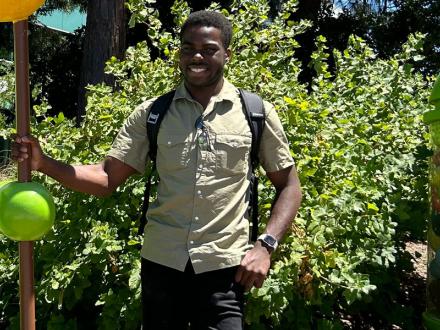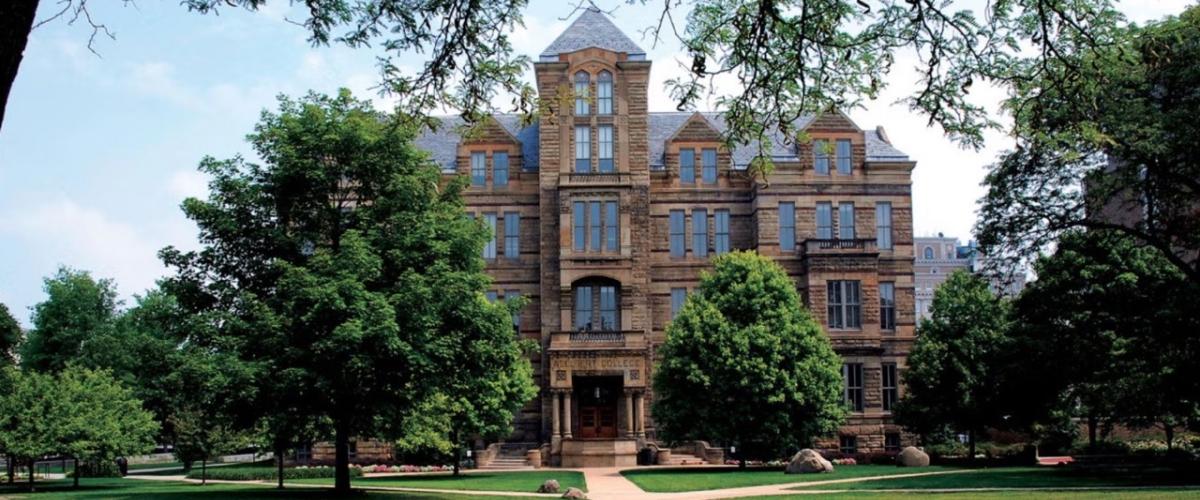
Spartan Showcase: Ray Ikome
As a high school student, Ray Ikome viewed coding as nothing more than a hobby. Though he took every course he could on the subject, he was determined to go to college for either biochemistry or neuroscience and go on to medical school.
Just a few years later, he’s already held internships with both Google and Microsoft on a path to a future career in computer science.
His path diverted when a friend pointed out Ikome’s computer science skills, and he began to rethink his future.
“He planted a seed that germinated soon after college application time,” Ikome said of his friend’s suggestion.
It has continued blooming, as Ikome is now a rising third-year student majoring in computer science and mathematics. He’s applied his skills in pretty notable settings, too. He has interned with both Google and Microsoft, and will return to Google again this fall to work with the company’s Android Auto team.
Last summer during his first Google internship, Ikome joined YouTube’s OTT Watch team to work on an open-source web browser called Cobalt. This summer at Microsoft, he is contributing to efforts to evaluate large-language models (LLMs).
Outside of his classwork and professional projects, Ikome is highly involved in several on-campus projects. He works alongside Weatherhead School of Management faculty member Sining Wang on his AI4EDU research initiative, which explores how humans interact with artificial intelligence, particularly in educational settings.
Ikome also works with peers to study complex problems with financial markets as part of CWRU Quants. He’s applied his engineering skills with the Case Rocket Team, helping develop an airbrake system, and the CWRU Chem-E Car, for which he develops circuitry solutions and software. Through CWRU’s competitive programming club, he represented the university at the International Collegiate Programming Competition.
“These activities are creative outlets for me—they help me apply concepts from class or from the workplace to my own projects,” Ikome said. “Additionally, the community I’ve built is invaluable; it’s what keeps me here. I’m proud to know all the hardworking, intelligent people I’ve met through clubs and research.”
Read more about how Ikome leaned into his hobby-turned-future career.
1. What initially drew you to CWRU?
I was drawn to CWRU by its reputation as a rigorous engineering school, its abundance of resources for students looking for hands-on experience (such as Sears think[box] and the Veale Institute for Entrepreneurship), and the flexibility with majors and programs (especially relevant since I originally planned to study biochemistry on the pre-med track).
I came for those things, but I stay for the campus culture. There are so many people here with such fascinating, unique combinations of preferences, and I’ve picked up so many new interests—academic and otherwise—from just listening to people talk about what makes them tick, and thinking “Maybe I should give that a try? This person seems really passionate about it.”
2. How did you find out about your internship opportunities?
I learned about Google’s internships in the process of applying for Google’s Summer of Code in my senior year of high school (which I was rejected for). I learned about Microsoft’s AI initiatives and plans to become a dominant player in LLM research and development from fellow interns at Google last summer.
I will say that finding out about opportunities is a sort of snowball. Finding out about an opportunity and giving it your all to get it introduces you to more people who know about more opportunities in more places.
3. What do you feel helped prepare you to work for such well-known companies? Did your education at CWRU play a role?
My education at CWRU definitely played a role! Starting with the interviews, I’ve had many interviews where the answer the interviewer was looking for could just be copied-and-pasted from a concept in one of my classes.
I also have to shout out the competitive programming team at CWRU—some interview questions are just watered-down versions of problems we solve there.
As for day-to-day work, my education has helped me think outside the box, challenge assumptions that were taken for granted, and work through cascading layers of software abstraction.
4. What were the most memorable experiences from these opportunities?
My most memorable experience at Google was presenting my work. While coding skills are important, communicating findings, results and steps forward to engineers and management is a crucial step of the process as well. I learned the art of making descriptive visuals, how to calibrate my message to different audiences, and other public speaking essentials. I’m learning more about these things now as I prepare to brief Microsoft’s Office of the CTO on my work this summer.
5. What were your biggest takeaways?
Building a relationship with your manager can get you connected with vastly more people in the company and get you exposure to different fields. At Microsoft, my organization also has quantum computing and robotics branches, and my manager was able to get me into their meetings and give me chances to see what frontiers they’re exploring. My host has been my biggest advocate this summer. If you also find a mentor, you double this effect.
6. What advice would you give to other students as they search for and work in their internships?
The tech startup community has the phrase “get off of localhost” (usually they phrase this… less politely!)
What does this mean? Well, “localhost” is the computer networking term for the device you’re currently using. Staying on localhost means you’re coding and building software, but you’re the only one using and accessing it, on your machine.
Getting off of localhost, therefore, means getting your software deployed and running in a place where other people can use it as well. This is great for many reasons—it forces you to have higher standards for features and code quality. It forces you to seriously consider security. It forces you to make intuitive interfaces and services. Demonstrating ability for these facets of software development is very important and helps immensely in internship recruiting.
In my case, I did this with a website that is used internally by the Undergraduate Student Government and with a desktop game that peaked at over 1,000 daily users, among other things. Both of these endeavors came up during my interviews last summer and directly helped me secure an offer.
7. What are your future career goals?
I don’t know for sure yet! I would love to continue learning more about how we can use AI for good in society. I also enjoyed the work I did at Google last summer and look forward to the fall, where I will do similar work again on Google’s Android Auto team.
I’m also looking into opportunities in quantitative finance, since I’ve enjoyed my time developing educational modules about whatever my quant trading fascination of the day is and developing trading systems with a team of talented software engineers. I feel like I would fit into any field where I can use both mathematics and computer science to solve important, difficult problems with talented peers. Under that condition, I’m willing to let the chips fall where they may.




